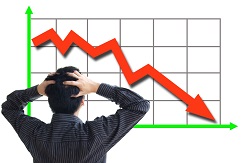Financial Post: Don't See a Recession Bear Market? Here, Try These Glasses on!

Article by David Rosenberg in Financial Post
The S&P 500 is on the precipice of declining 20 percent from the peak, but the majority of its members have already done so, and wide swaths of consumer discretionary stocks and the financials are down much more than that, so debating whether we are in an “official” bear market at this point is purely a case of semantics. If it walks like a duck …
I find it strange, and perhaps even a tad disingenuous, that the same bulls who shouted, “don’t fight the Fed!” when the market was going asymptotic to the upside are now telling people to fight the United States Federal Reserve on the other side of the mountain. To these folks, it’s as if economic and market cycles don’t exist.
The adage that posits to know where you’re going, you must know where you’ve been, certainly applies. From the end of 2018 to the end of 2021, the Fed eased monetary policy, via interest rates and an expanded balance sheet, by 850 basis points. In the process, it destroyed the equity risk premium. No wonder asset prices soared, with the stock market doubling over that time span — that’s a two-standard-deviation event right there. Who ever knew that the first global pandemic in over a century could have made so many people so wealthy? Should we try it again?
But, you see, 70 percent of that three-year bull market was due to the expanded P/E multiple — “animal spirits” — while earnings growth was a two-bit player, accounting for the other 30 percent. Historically, those relative contributions are reversed.
In these past four very rough months, we have started to see the mean-reversion process take hold when it comes to the multiple now contracting. As it should with the Fed tightening policy and threatening to do much more. If the Fed does all it is pledging to do, with higher rates and a shrinking balance sheet, the de facto tightening will come to around 4%. You have to go back to the early 1980s to see the last time the Fed got so aggressive in such a short timeframe.
Which brings me to earnings, because that is the next shoe to drop, and when it does, only the most visually challenged will be debating about whether or not we are in a bear market.
There has never been a GDP recession without an earnings recession, full stop.
The S&P 500, historically, has gone down 30% in recession bear markets
The stock market has done a lot of work to price in a recession, but is so far discounting one-in-three odds. More to do still. We ran some models to see where financial conditions have to tighten to if the Fed is, indeed, serious about getting inflation back towards its two percent target. You won’t like the answer if you are still trading risk assets from the long side: 7% on high-yield bonds (another 2.50 to go) and call it 3,100 on the S&P 500 (another 20% downside).
This makes perfect sense since the S&P 500, historically, has gone down 30% in recession bear markets. The first 10% before the recession as the downturn gets discounted, and then the next 20% through the first three-quarters of the recession. Keep in mind, however, that there is wide dispersion around that “average,” and we have to acknowledge that between the ongoing pandemic and the war abroad, together with this very hawkish Fed, we are into a prolonged period of heightened uncertainty, which means the earnings recession could bump against a further compression in the market multiple. My hope is that the 3,100 trough doesn’t end up proving to be overly optimistic. Yes, you read that right.
The Fed has embarked on 14 tightening cycles since 1950, and 11 landed the economy in a recession and the stock market in a bear phase. That’s a nearly 80% probability right there, though as I already said .......
To read this article in Financial Post in its entirety, click here.